 Weird Stuff
Weird Stuff  Weird Stuff
Weird Stuff  Mysteries
Mysteries 10 Tragic Disappearances and Deaths in Joshua Tree National Park
 History
History 10 Ways Childhood Really Sucked in the Old West
 Music
Music 10 Name Origins of Famous Bands from the 1990s
 Religion
Religion 10 Biggest Turnarounds by the Catholic Church
 Weird Stuff
Weird Stuff 10 Unbelievable Times Laws Had Unintended Consequences
 Humans
Humans Ten Historic Women Who Deserve Way More Credit Than They Got
 Movies and TV
Movies and TV 10 Films That Spawned Major Lawsuits
 History
History Ten Times Towns Were Wiped Off the Face of the Earth
 Creepy
Creepy 10 of the Most Disturbingly Haunted Public Houses in the UK
 Weird Stuff
Weird Stuff 10 Niche Subcultures That Are More Popular Than You Might Think
 Mysteries
Mysteries 10 Tragic Disappearances and Deaths in Joshua Tree National Park
 History
History 10 Ways Childhood Really Sucked in the Old West
Who's Behind Listverse?

Jamie Frater
Head Editor
Jamie founded Listverse due to an insatiable desire to share fascinating, obscure, and bizarre facts. He has been a guest speaker on numerous national radio and television stations and is a five time published author.
More About Us Music
Music 10 Name Origins of Famous Bands from the 1990s
 Religion
Religion 10 Biggest Turnarounds by the Catholic Church
 Weird Stuff
Weird Stuff 10 Unbelievable Times Laws Had Unintended Consequences
 Humans
Humans Ten Historic Women Who Deserve Way More Credit Than They Got
 Movies and TV
Movies and TV 10 Films That Spawned Major Lawsuits
 History
History Ten Times Towns Were Wiped Off the Face of the Earth
 Creepy
Creepy 10 of the Most Disturbingly Haunted Public Houses in the UK
10 Unexpected Perks To Becoming The Queen Of England
Looking for a job with good benefits? You can’t do much better than becoming the queen of England. Sure, it takes a certain skill to bring about the series of calamities you’d need to become next in line for the throne, but becoming the matriarch of the British royal family has some perks.
The British monarchy is a strange system built on customs and laws that are hundreds of years old—and that has given Queen Elizabeth II some insane powers. There are privileges in the British law books that let the queen do some crazy things that we’re just kind of counting on her not to do.
If the queen ever went mad with power, she could have one hell of a day.
10 Legal Ownership Over All Dolphins
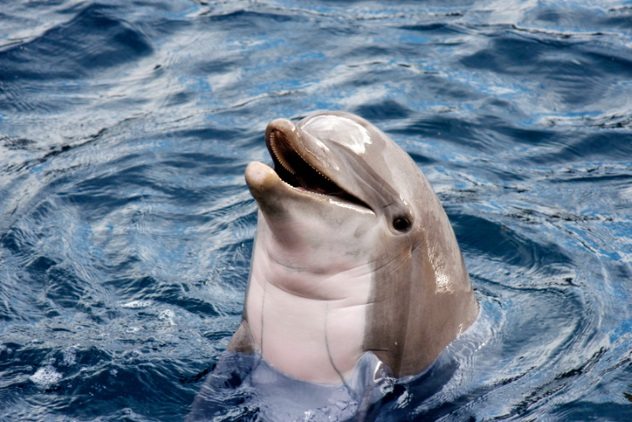
If a dolphin comes within 5 kilometers (3 mi) of the shores of the United Kingdom, it becomes the legal property of Queen Elizabeth.
The queen’s powers aren’t actually limited to dolphins; she has legal ownership of all “fishes royal,” a category that includes whales, porpoises, dolphins, and other animals that aren’t fish. The law explicitly gives her the right to eat them—so anytime somebody captures a porpoise or a whale gets beached on the shore, Queen Elizabeth can show up with a fork and call first dibs.
It’s a law that has been in the books since the 1300s, when Edward II demanded it. If Queen Elizabeth ever tried to apply it, though, you could fight her on the details. As the law is written, only a king can demand a full whale.[1] If the queen, as a woman, demands you give her your whale, you can get away with just cutting off its tail and sending it to Buckingham Palace.
9 Mandatory Gifts Of Goblets And Roses

If the marquess of Ailesbury invites Queen Elizabeth over for tea, he’s putting himself in a prickly position. Under the contract his family signed with King Edward VI, the marquess, anytime the queen visits, is required to sound a 0.6-meter (2 ft) hunting horn made from an elephant’s tusk. Then he has to serve her drinks in ivory goblets and invite her to take the goblets home—or else he can lose his property.
It seems silly, but the law has almost cost the family their property before. When King George III visited the marquess, he told him that he’d had a nice time, before declaring, “You have forgotten, however, to blow your tenure horn. When a king of England comes here and that horn is not blown, your property becomes forfeited to the crown.”[2]
King George let him off with a warning, but legally, he could have taken the property. And that’s not the only weird rule like it. Other lords have to give the queen roses whenever they see her, or like the marquis of Ailesbury, they could lose their property.
8 A Staff Member Wears In The Queen’s New Shoes
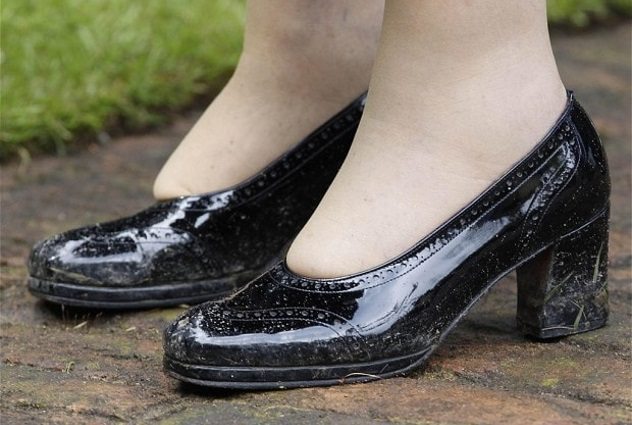
The queen never puts on a brand-new pair of shoes. She simply refuses to walk around in a set of loafers before they’ve been worn in—so she hires people to wear her new shoes for her.
Queen Elizabeth has a staff member whose sole job is to walk around with new shoes on before she wears them. She’s worried, apparently, that her feet will get sore and blistered if she slips on a new pair herself, and the crown insists that she simply can’t be spotted complaining about uncomfortable feet or changing her shoes.
Queen Elizabeth also has a team of people who keep track of everything she wears every day to make sure that nobody ever sees her wearing the same clothes twice for the same event.[3] Every time she meets the prime minister, a team checks everything she’s worn while meeting prime ministers in the past, lest she be caught in a gauche purple dress two times in a row.
7 The Queen Can Eat Swans
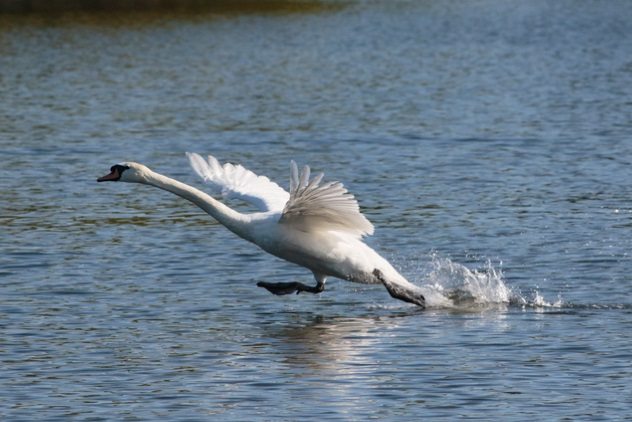
We should start by explaining that most British people can’t hunt and eat swans, which is a fact that, if you’ve never tried it, you may never have learned. A man named Hasan Fidan tried it, though, and he learned the hard way.
Fidan spotted a swan at a local park and, as any of us would, chased it down, ripped its head off, stuffed its bleeding body into his backpack, carried it home, and crammed its dismembered body into his freezer. This, Fidan figured, would probably be fine—until the police showed up. In England, the officers explained, only the queen may run down, slaughter, and devour the raw flesh of swans.
The law has been in the books since the 12th century, when the monarchy ordered that no citizen would be allowed to eat British swans. It wasn’t that they cared about animal rights; they just thought that swans were delicious, and they didn’t want commoners hogging them all.[4]
To this day, Queen Elizabeth goes out in July of every year and has her swans counted in a ceremony referred to as “swan upping.” And the law is still enforced. Offenders, like Hasan Fidan, are fined £110.
6 The Queen Can Commandeer Boats
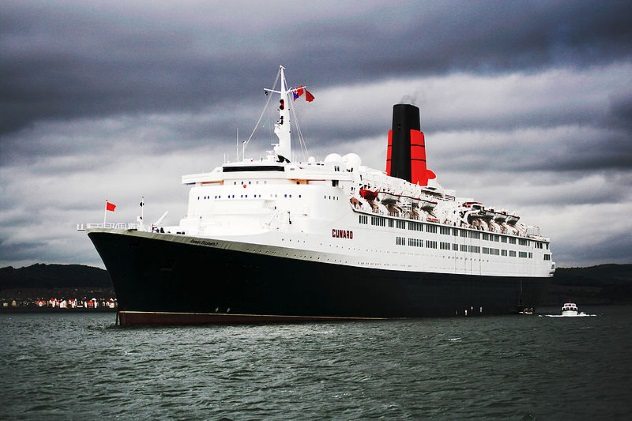
The queen has the power to commandeer any British ship. So if you’re British and own a yacht, you might want to make sure Queen Elizabeth doesn’t see it. She has to right to take it from you—and she’s done it before.[5]
Granted, it wasn’t exactly on a whim, but it happened. In 1982, a cruise ship company advertised that its luxury liner, Queen Elizabeth 2, often referred to as the QE2, was “the greatest ship in the world,” so the British government used the queen’s powers to take it from them.
They declared they needed the ship to invade the Falklands, saying that its “speed, size, and facilities made [it] uniquely suited” to carrying soldiers, which was basically just the British military admitting that cruise lines were better at making ships, so they were going to steal them.
It’s best not to question the queen when she commandeers your boat, though, because she has other powers. If she decides there’s a “grave national emergency,” Queen Elizabeth has the power to “take and destroy private property” without limitation, so maybe it’s best just to let her take your boat.
5 The Queen Does Not Require ID

Despite the constant travel involved in queening and all business related to queenery, Queen Elizabeth doesn’t have a passport. As queen of England, she doesn’t need one.
All British passports are technically issued by the queen. They come with a note asking anyone who reads it to “allow the bearer to pass freely and without let or hindrance,” requested “in the name of Her Majesty.”[6]
Since they’re issued in her name, Queen Elizabeth doesn’t actually have to have a passport—or any ID, for that matter. She can drive without a license and buy lottery tickets without proving she’s over 16, and she can probably be pretty easily replaced by a doppelganger if anyone’s looking for a creative heist idea.
The rest of the royal family do need passports, as do most other world leaders. The Danish royal family definitely use passports, as does America’s secretary of state, who issues US passports. So the real reason the queen doesn’t need a passport might have a bit less to do with her role as monarch and bit more with to do her willingness to put up a fuss about it.
4 The Queen Can Demand Snowballs In The Summer

Queen Elizabeth has the legal right to have snowball fights in July. And if your last name is Fowlis, she can make you get the snowballs.
When the Fowlis family of Scotland bought land from the monarchy centuries ago, the king only agreed to sell on one condition: If the monarchs of England wanted a snowball in the middle of the summer, they demanded, the Fowlis family had to get them one.[7]
This wasn’t impossible—but it was a pain. The Fowlis family owned a mountain that had year-round snow at the peak. If the royal family felt like seeing some snow, they could send a Fowlis to climb to the top of the mountain, roll some into a ball, and bring it down.
They’ve actually used this power, albeit it not that recently. In 1746, the duke of Cumberland came by the Fowlis property and made them get him some snow to cool his wine. He told them it was an order from the king, and the family had to scale a mountain in the middle of the summer just so the duke could chill a bottle of wine.
3 The Queen Can Veto Any Law

If she wanted to, Queen Elizabeth could really shake things up. Anytime Parliament passes a law, she technically has the right to veto it.
Every law in the Commonwealth is passed in the name of the queen. That doesn’t necessarily mean that she’s read them, but it does technically give her the power not to pass a law.[8] And that doesn’t just apply in England. Hypothetically speaking, she could veto laws in Canada, Australia, Jamaica, and New Zealand, to name just a few places.
In 1999, Queen Elizabeth actually did so. Parliament had put through a bill that would have transferred the power to authorize military strikes from the queen to Parliament, and she refused to sign. She didn’t want to transfer her military authority away—so she skirted the democratic process and shut it down.
2 Laughter And Merriment Are Forbidden When She Dies

When Queen Elizabeth dies, the people of Britain will be strictly forbidden from being funny on public television. For the 12 days between her death and her funeral, all BBC channels are under strict orders not to air anything funny.[9]
Her whole death has been plotted out in advance. When the queen dies, all BBC channels will stop whatever they’re showing and cut to the announcement that she has died. The station even has black ties and suits on hand at all times so that their anchors are ready to dress appropriately when they break the news.
They also have a series of documentaries and retrospectives on Queen Elizabeth’s life already recorded and sitting in their vaults, waiting to be played ad nauseam until Britain is appropriately sad about her passing.
Other countries will have to participate, too. Countries in the Commonwealth will be expected to fly the Union Jack at half-mast for 12 days until the queen is buried.
1 The Queen Is Above The Law
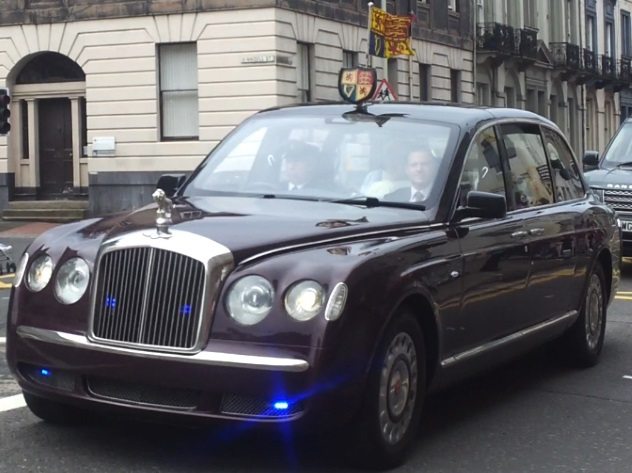
In truth, the queen can just do whatever she wants. She doesn’t just have a few powers—she’s above the law.
British law has a clause that says that “civil and criminal proceedings cannot be taken against the sovereign” of the United Kingdom. Queen Elizabeth, in other words, can’t be taken to court, no matter what she does.
The queen is the only member of the royal family who can safely drive a Rolls Royce into the side of a building and get away with it. Her kids can still earn criminal records, but she’s completely safe. Officially, police aren’t even supposed to arrest other people when she’s nearby.[10]
Queen Elizabeth can’t even be forced to testify or give evidence in court, and there’s a legal precedent holding that up. In 1911, King George V was accused of bigamy and ordered to defend himself in court. The lord chief justice, though, ruled that as the monarch, King George couldn’t be forced to give evidence. This means that the queen is legally protected to do whatever she wants, and she doesn’t even have to explain herself.
Read more odd tidbits about Britain’s monarchy on 10 Curious Facts About The British Monarchy and 10 Misconceptions About the British Monarchy.








